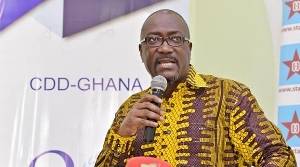Professor H. Kwasi Prempeh, Executive Director of the Ghana Center for Democratic Development (CDD-Ghana), has expressed concerns about the current procedure for dismissing justices of the higher courts, calling for increased transparency and institutional reform.
This follows the recent suspension of Chief Justice Gertrude Araba Esaaba Sackey Torkornoo.
Prof. Prempeh strongly criticized Article 146 of the 1992 Constitution, which outlines the process for removing justices of the higher courts, including the Chief Justice.
“I have at least two problems with Article 146 in its present form,” he stated. “First is the secrecy or lack of transparency surrounding the removal petition. Even if the removal proceedings must be held in camera, I believe that, at a minimum, the findings and outcome of the proceedings including the grounds and supporting evidence behind the removal petition—must be made public after the fact.”
He emphasized that accountability and access to information are essential for preserving public trust in the judiciary.
“The public must not be kept in the dark as to why a removal petition failed or succeeded,” he said. “In the interest of justice, I believe the grounds and evidence supporting the committee’s decision whichever way it goes must be made public, so that the public, too, can judge for themselves whether justice was served,” he was quoted as saying by citinewsroom.com.
Professor Prempeh also raised concerns about the composition of the five-member committee tasked with investigating removal petitions, especially when the Chief Justice is involved.
“Where the removal petition pertains to a Chief Justice, no sitting judge should be included in the five-person removal committee constituted to hear the petition,” he argued.
“None of the CJ’s judicial peers should sit in judgment on a removal petition involving their judicial colleague or ‘boss,’ as they are likely to have an interest in the outcome.”
He advocated for a more politically inclusive and impartial process for selecting committee members, suggesting the use of retired jurists or experienced public servants to eliminate conflicts of interest.
“It is better to keep the President out of the removal process, except to implement, after the fact, the final outcome of the process as determined by an independent removal committee,” he added.
On April 22, 2025, President John Mahama announced the suspension of Chief Justice Gertrude Torkornoo, following the establishment of a prima facie case based on three separate petitions seeking her removal from office.
The suspension, implemented in accordance with Article 146(6) of the Constitution, followed the President’s consultation with the Council of State.
In line with constitutional provisions, Justice Paul Baffoe-Bonnie, the most senior Justice of the Supreme Court, has assumed the role of Acting Chief Justice.
A five-member committee has been established to look into the claims, but the public, civil society, and legal experts are all becoming increasingly alarmed by the lack of public transparency about the substance of the petitions and the supporting documentation.
KA
Is Mahama also a traitor for meeting Akufo-Addo? Watch as Koku Anyidoho questions Ghanaians



